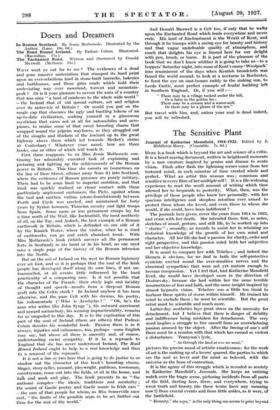Doers and Dreamers
In Roman Scotland. By Jessie Mothersole. Illustrated by the Author. (Lane. 10s. 6d.) The Road Round Ireland. By Padraic Colum. Illustrated. (Macmillan. 17s.) The Enchanted Road. Written and illustrated by Donald Maxwell. (Methuen. 21s.) WnAT went ye out for to sec ? The evidences of a dead and gone massive materialism that stamped its hard print upon an ever-rebellious land in stone-built barracks, bakeries and bathhouses, and those grim roads which hold their undeviating way over moorland, torrent and mountain- peak ? Or is it your pleasure to savour the aura of a country that was once " a land of rainbows to the whole wide world " —the Ireland that of old spread culture, art and religion over its sister-isle of Britain ? Or would you put on the magic cap that obscures the ugly and hustling tokens of an up-to-date civilization, soaking yourself in a glamorous mysticism that cares not at all for automobiles and aero- planes, to realize some of that sweet brooding charm that wrapped round the pilgrim wayfarers, as they struggled out of the sloughs and thickets of the lowland up to the great highway above them which led towards Becket's shrine at Canterbury ? Whatever your mood, here are three books, one or other of which will touch it.
First there reappears to us Miss Jessie Mothersole con- tinuing her admirably executed task of explaining and picturing and lighting up the achievements of the Roman power in Britain. This time she escorts us (sometimes on the line of Dere Street, oftener away from it) into Scotland, where the evidences of Roman presence are purely military. There had to be some limit to imperial ambition, and that limit was quickly realized on closer contact with those particularly unpleasant customers, the Picts, against whom the turf and earthen vallum (stone-foundationed) between Forth and Clyde was erected, and maintained for forty years by Syrian bowmen, Thracian cavalry and light troops from Spain. Some more or less permanent camps lay for a time north of the Wall, like Inchtuthill, the most northerly of all, on the Tay, and Ardoch, the best example of a Roman earthwork in Britain, which is defended on one side of it by the Knaick Water, where the visitor, when he is tired of earthworks, can go and catch abundant trout. With Miss Mothersole's book (which surveys all the permanent forts in Scotland) in his hand or in his head, no one need miss a single page of the history of the Roman intrusion into the North.
But on the soil of Ireland on the west no Roman legionary ever set foot, and so it is perhaps that the soul of the Irish people has developed itself along its own lines, if not un- trammelled, at all events little influenced by the hard practicality of a conquering race. Is it not possible that the character of the French—their steely logic and lucidity of thought and speech—results from a deep-set Roman graft into the Celtic stock ? In Ireland anyhow it has been otherwise, and the pure Celt with his dreams, his poetry, his rodomontade (" Who is Aeschylus ? " " Oh, he's the man who writes like John Synge"), his outward merriment and inward melancholy, his seeming impracticability, remains for us unspoiled to this day. It is to the explication of this part of the soul of Ireland (there are others) that Padraic Colum devotes his wonderful book. Passion there is in it always, injustice and callousness, too, perhaps—some English may say, but above all there is sincerity and, of course, understanding racial sympathy. If it be a reproach to England that she has never understood Ireland, The Road Round Ireland ought to help to a real knowledge and then to a removal of the reproach.
It is not a line or two here that is going to do justice to or shadow out the character of this book's haunting charm. Singer, story-teller, peasant, playwright, publican, townsman, countryman, come out into the fields, or sit in the house, and talk and work and play. The book presents to us " the national complex—the ideals, traditions and mentality ; the sound of Gaelic poetry and Gaelic music in Irish ears ". —the ears of that people for whom, as Miss Somerville once said, " the limits of the possible seem to be set farther out than for the rest of the world." And Donald Maxwell is a Celt too, if only that he walks upon the Enchanted Road which leads everywhere and never ends. His land of Enchantment is the Weald of Kent, and through it he tramps with a seeing eye for beauty and history and that vague undefinable quality of atmosphere, and much that delights his eye is limned here for our delight with pen, brush, or burin. It is part of the pleasure of the book that we don't knoiv whither it is going to take us—to a hoppers' Saturday night, into some of Kent's many Woolpack' inns reminiscent of the days when Kentish broadcloth, was
rn
famed the world around, to look at a nocturne in Rochester, to feast the eye on oast-houses ruddy in the sinking sun, to Leeds Castle, most perfect example of feudal building left in Southern England. Or, if you will :— " There may be a village tucked under the hill, Or a farm in the golden leo : There may be a stream and a water-mill, Or there may be a gleam of the sea."
But travel with him, and, unless your soul is dead indeed, you will be refreshed.


































 Previous page
Previous page